

Introduction to General Philosophy Course. Philosophy for Beginners - Download free content from Oxford University. Philosophy and Science of Human Nature - Download free content from Yale University. Critical & Creative Thinking - Download free content from University of Massachusetts Boston. Critical Reasoning for Beginners - Download free content from Oxford University. UC Berkeley - Download free content from UC Berkeley. Free Philosophy Courses.
This is a free syllabus in philosophy for all those students who can’t afford to attend a school where these courses are offered.
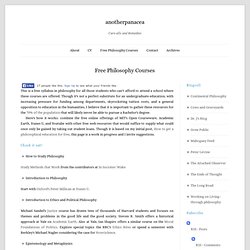
Though it’s not a perfect substitute for an undergraduate education, with increasing pressure for funding among departments, skyrocketing tuition costs, and a general opposition to education in the humanities, I believe that it is important to gather these resources for the 70% of the population that will likely never be able to pursue a Bachelor’s degree. Here’s how it works: combine the free online offerings of MIT’s Open Courseware, Academic Earth, Itunes U, and Youtube with other free web resources that would suffice to supply what could once only be gained by taking out student loans. Though it is based on my initial post, How to get a philosophical education for free, this page is a work in progress and I invite suggestions. Check it out! How to Study Philosophy Study Methods that Work from the contributors at In Socrates’ Wake. Power Structuralism in Ancient Ontologies - Download free content from Oxford University. Aesthetics and Philosophy of Art lectures - Download free content from Oxford University.
UC Berkeley - Download free content from UC Berkeley. Philosophy 185 - Fall 2007: Heidegger - Download free content from UC Berkeley. Philosophy at the School of Advanced Study - Download free content from University of London. Philosophy Special Lectures - Download free content from Oxford University. Podcasts. The John Locke Lectures The John Locke Lectures are among the world's most distinguished lecture series in philosophy.
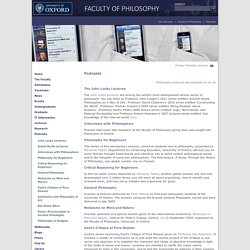
You can listen to Professor John Cooper's 2011 series entitled 'Ancient Greek Philosophies as a Way of Life', Professor David Chalmers's 2010 series entitled 'Constructing the World', Professor Thomas Scanlon's 2009 series entitled 'Being Realistic about Reasons', Professor Hartry Field's 2008 lecture series entitled 'Logic, Normativity, and Rational Revisability'and Professor Robert Stalnaker's 2007 lectures series entitled 'Our knowledge of the internal world' here. Linguistics and Philosophy. Habits of Mind. Critical thinking web. Intute: Encouraging Critical Thinking Online.
Encouraging Critical Thinking Online is a set of free teaching resources designed to develop students' analytic abilities, using the Web as source material.
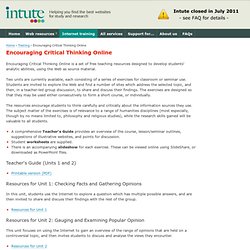
Two units are currently available, each consisting of a series of exercises for classroom or seminar use. Students are invited to explore the Web and find a number of sites which address the selected topic, and then, in a teacher-led group discussion, to share and discuss their findings. The exercises are designed so that they may be used either consecutively to form a short course, or individually. The resources encourage students to think carefully and critically about the information sources they use. The subject matter of the exercises is of relevance to a range of humanities disciplines (most especially, though by no means limited to, philosophy and religious studies), while the research skills gained will be valuable to all students.
Teacher's Guide (Units 1 and 2) Printable version (PDF) Thinking Tools. Rhetological Fallacies. Hilbert's Program. First published Thu Jul 31, 2003 In the early 1920s, the German mathematician David Hilbert (1862-1943) put forward a new proposal for the foundation of classical mathematics which has come to be known as Hilbert's Program.
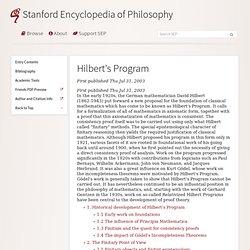
Philosophy of Mathematics. First published Tue Sep 25, 2007; substantive revision Wed May 2, 2012 If mathematics is regarded as a science, then the philosophy of mathematics can be regarded as a branch of the philosophy of science, next to disciplines such as the philosophy of physics and the philosophy of biology.
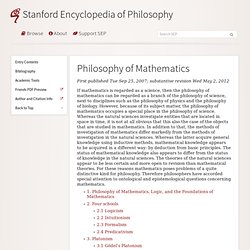
However, because of its subject matter, the philosophy of mathematics occupies a special place in the philosophy of science. Whereas the natural sciences investigate entities that are located in space in time, it is not at all obvious that this also the case of the objects that are studied in mathematics. In addition to that, the methods of investigation of mathematics differ markedly from the methods of investigation in the natural sciences. Whereas the latter acquire general knowledge using inductive methods, mathematical knowledge appears to be acquired in a different way: by deduction from basic principles. 1. 2. 2.1 Logicism. The Problem of Dirty Hands. First published Wed Apr 29, 2009; substantive revision Mon Jan 27, 2014 Should political leaders violate the deepest constraints of morality in order to achieve great goods or avoid disasters for their communities?
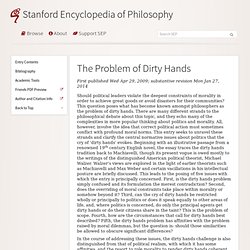
This question poses what has become known amongst philosophers as the problem of dirty hands. There are many different strands to the philosophical debate about this topic, and they echo many of the complexities in more popular thinking about politics and morality. All, however, involve the idea that correct political action must sometimes conflict with profound moral norms. This entry seeks to unravel these strands and clarify the central normative issues about politics that the cry of ‘dirty hands’ evokes. 1. Anthony Trollope's novel, The Way We Live Now, is a biting critique of the corruption of late Victorian morals. Aesthetic Judgment. First published Fri Feb 28, 2003; substantive revision Thu Jul 22, 2010 Beauty is an important part of our lives.
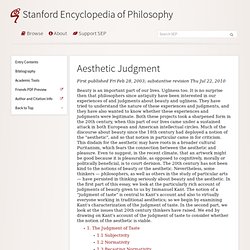
Ugliness too. It is no surprise then that philosophers since antiquity have been interested in our experiences of and judgments about beauty and ugliness. They have tried to understand the nature of these experiences and judgments, and they have also wanted to know whether these experiences and judgments were legitimate. Both these projects took a sharpened form in the 20th century, when this part of our lives came under a sustained attack in both European and American intellectual circles. 1. Socratic Seminar Guidelines: A Practical Guide. Balancing Participation: In the first discussion of any group, three to five people will monopolize the conversation right away.
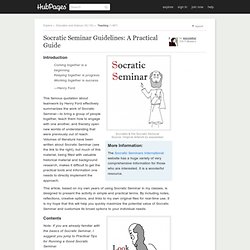
This is natural but far from ideal. Ideally, the conversation is equally shared among all of the participants. Those who naturally dominate should be encouraged to listen first and speak later. Those who rarely speak should be encouraged to participate at least once. Try out some of the following ideas to help support this: Inside the Classroom Door… » Socratic Seminar Guide. Socratic Seminar Preparation Guide A Socratic seminar is one where we examine a text for a deeper understanding of the ideas rather than “right” answers. It requires knowledge of the text and using the text to support your thoughts. The questions are mostly open-ended—they invite discussion. Philosophy and personal development. Broadcast Yourself. 1 - 1 - Philosophy, Modernity, and Intellectual History, part 1 of 2 (14-18) 1 - 2 - Philosophy, Modernity, and Intellectual History, part 2 of 2 (9-57) Philosophy.
Philosophy. Logos. Philosophy of Mind. Philosophy & Psychology.